Captain of the White Tower
Boromir - Son of Denethor II
“A tall man with a fair and noble face, dark haired and grey-eyed, proud and stern of glance. He had a collar of silver in which a single white stone was set; his locks were shorn about his shoulders. On a baldric he wore a great horn tipped with silver that now was laid upon his knees.”
In last weeks article, when looking at the doubts and fears of Theoden, King of Rohan, I railed against the idea that The Lord of the Rings is a simplistic tale of good versus evil, when it is inhabited by such rich and complex characters.
This week, I wanted to discuss the most, and I mean this in every sense of the word, human member of The Fellowship of the Ring, Boromir, Steward Prince of Gondor. Now that might be an obvious statement in a party that contains an elf, a dwarf, hobbits and a wizard that has lived for thousands of years, yet he is a perfect example of someone who always tried to follow the path of light by being kind and honourable, but is tragically tempted, and defeated by the darkness of greed and pride. However, hopefully I’ll be able to show that there were mitigating circumstances for the choices made by a desperate man who was pushed to his limit.
Again, I’ll be flicking between the books and movies but, for someone who is in the novel for less than 200 pages, with only about 30 minutes of screen time, there is plenty of rich material to get stuck into.
“By our valour, the wild folk of the East are still restrained, and the terror of Morgul kept at bay, and thus alone are peace and freedom maintained in the lands behind us, bulwark of the West.”
Gondor was the most powerful kingdom of humans in Middle Earth. It was bordered by Rohan to the north, the sea to the west and Mordor to the east. It had been founded by the great kings Isildur and Anarion who were exiles from the doomed island of Numenor. What had once been a great maritime and military state was weakened over the years by repeated attacks from without and within, leading to its perilous state by The Third Age.
During this time, the line of kings was broken and, as the story of Lord of the Rings begins, Gondor, from the great white capital city of Minas Tirith, is ruled by Stewards, who swore an oath to look after the country until the true heir of Isildur or Anarion would return. However, after so many years, most considered this to be nothing more than a myth, and the Stewards are de facto kings in all but title.
Boromir was the eldest son of the current Steward of Gondor, Denethor II. Along with his brother Faramir, with whom he had a close relationship, he was known as one of the greatest warriors Gondor had ever known and had fought in many battles against the forces of Mordor. As the power of Sauron began to rise once more and Mount Doom explodes into life, he is tasked with attending the Council of Elrond to get advice on how to defeat the enemy of all Middle Earth.
Tolkien famously disliked allegory and repeatedly denied that real world events had any bearing on the story. However, with Gondor, and taking into account when the books were written, it’s hard not to see comparisons with the start of World War II with France defeated and Britain standing alone, facing a vast and powerful evil empire rising to the east that sought to destroy all of civilisation as we know it.
As Boromir says in the quote above, Gondor had been continually fighting to keep the lands to the west safe. As with Theoden in my previous article, he has seen many of his men fall in that defence but, perhaps unlike the aging king, that has made him all the more determined that the battle against Mordor must be won by any means possible.
“Seek for the Sword that was broken;
In Imladris it dwells;
There shall be counsels taken
Stronger than Morgul-spells
There shall be shown a token
That Doom is near at hand
For Isildur’s Bane shall waken
And the Halfling forth shall stand”
These words are spoken to Boromir in a dream before he travels to Rivendell, just after losing the battle for control of the City of Osgiliath to the invading Orcs. I know in the extended edition of the Two Towers we see him free the city prior to his journey, but the book makes more sense, as it adds to his urgency and desperation. He can see that the war is turning against them, and when he hears, at the council, that the one ring has been found, he thinks he has the weapon that can finally defeat his enemy.
So, his incredulity and perplexity at what is being discussed is probably understandable.
“Why do you speak ever of hiding and destroying? Why should we not think that the Great Ring has come into our hands to serve us in the very hour of need? Wielding it the Free Lords of the Free will surely defeat the enemy.”
Here is a foreshadowing of the corruption that the ring is going to bring over Boromir, even if it is understandable that he thinks a mighty weapon, sprung out of myths and legends, should aid his struggling kingdom in its plight.
In both the book and the film we see Boromir dissuaded of his plan to bring the ring to Gondor, but in the movie the Council’s plan to destroy it in the fires of Mount Doom brings a stark warning.
“One does not simply walk into Mordor. It’s black gates are guarded by more than just orcs. There is evil there that does not sleep, and the Great Eye is ever watchful. It is a barren wasteland, riddled with fire and ash and dust, the very air you breathe is a poisonous fume.”
These wonderful lines, not written by Tolkien, but by the screenwriter, Philippa Boyens, which have been much memed, reflect an inflection point where the film and book deviate when it comes to Boromir. Here he is much more strident that this idea is a folly and should not be pursued. Initially, I thought these words had been written by the author, as it perfectly describes what you imagine the blasted remains of no mans land to look like in between the trenches of World War I, of which Tolkien had first hand experience. The question for the narrative though is, does Boromir actually believe his words, or does he just want to get the ring back to his own land and try to use it against Mordor.
In the book, Aragorn also shows Boromir the shards of Narsil, the sword that was broken cutting the one ring from Sauron’s hand, and although he still has doubts, even though another part of his dream has now been explained, it sets the seed in his mind that this Ranger may in fact be the heir to the kings of old and he is almost compelled to follow his lead.
With the film, it’s not so clear, as Narsil is introduced on a statue in Rivendell where the two men discuss the sword without Aragorn laying claim to it. Boromir goes with the Fellowship to supposedly see that the quest gets done, but his reaction to Aragorn being the potential heir is that, “Gondor has no king. Gondor needs no king,” so we see him already being manoeuvred to be the enemy within.
As the book continues, Boromir does mention a couple of times that the road past Rohan into Gondor would be the best rather than over the mountains or through Moria but, again, apart from being a little grumpy now and then, he is mostly a brave and loyal fighter of The Fellowship, helping the hobbits through the snow or fighting off the orcs at Balin’s tomb.
However, the Boromir of the movie, as played by Sean Bean, still continually tries to get the company to head for his homeland as per the written word, but his all consuming temptation by the ring is shown from a much earlier point, and there are scenes where he and Aragorn, despite the growing admiration between the two men, nearly come to blows over his lust for its power.
“It is a strange fate that we should suffer so much fear and doubt over a small thing. Such a little thing.”
Frodo falls whilst climbing through the snow on the mountain of Caradhras, which is not long after they have left Rivendell, and the chain holding the rings falls from his neck. Boromir picks it up and goes into a trance as it wheedles its way into his psyche. It takes Aragorn shouting at him to break his reverie and hand the ring back. But it’s clear that if he hadn’t, the Ranger was willing to kill him.
Even in Moria, where Gandalf, (who had previously warned Frodo, “Evil will be drawn to you from outside the fellowship, and, I fear, from within” whilst looking at the man from Gondor), is about to fall into Khazad-dum, Boromir is the first one to stop the hobbit from rushing towards the struggling wizard. Is he trying to save Frodo, or is he just trying to protect the ring from harm?
That is not to say that he is constantly portrayed as the villain of the piece. He fights bravely in the attack at Balin’s Tomb, and even at Lothlorien, before he is singled out by Galadriel as someone who might not be true to the company, he tries to comfort Frodo on the loss of Gandalf and we see that he does still have good in his heart.
“Gandalf’s death was not in vain, nor would he have you give up hope. You carry a heavy burden, Frodo. Don’t carry the weight of the dead.”
This shows the conflict that is going on in his soul as he struggles to reconcile what he knows he should do, with what he is being compelled to do. When The Fellowship reach the great river, Anduin, the book and movie merge again and the madness has almost completely overcome the brave warrior.
Having, once more, fallen out with Aragorn about the path they are taking, Boromir begins to act strangely, speaking to himself and becoming much more withdrawn.
“Boromir sat muttering to himself, sometimes biting his nails, as if some restlessness or doubt consumed him”
And so we come to it. As The Fellowship take rest, Frodo, as the ring bearer, asks for time to consider their next move. He wanders off and is confronted by Boromir who, exasperated by all the delays and obfuscation, decides to take the ring for himself.
He has seen his people suffer and he wants to return his homeland to its former glory. The only way he sees to do that, is to use the ring as a weapon and not let some little hobbit take it into Mordor, where he’ll be easily captured. After that it will only be a matter of time until Sauron, with his power fully restored, turns his attention to crushing Gondor once and for all on his way to ruling all of Middle Earth.
Yes, the ring is twisting his mind, but these prideful thoughts are already there, and it takes but a little push from the spirit of the Dark Lord to make it seem like he has no choice. However, he goes too far, whilst imagining himself as a mighty king wielding the ring, he loses his temper, which we have seen in the movie before, but seems all the more shocking in the book where he has mostly been the stoic warrior, and forces Frodo to put on the ring and disappear.
“Miserable trickster! Let me get my hands on you! Now I see your mind. You will take the ring to Sauron and sell us all. Curse you and all halflings to death and darkness!”
Boromir finally comes to his senses and realises what he has done, but it is too late.
The book is quite funny at this point, as he returns to the camp and sits for about half an hour as if nothing has happened, before explaining what he has done. Whereas, in the movie, as with most of Jackson’s adaptation, everything happens with a higher degree of urgency.
As the other hobbits run into the forest to try and find Frodo and the Uruk-hai Orcs close in, chaos descends as the rest of The Fellowship try vainly to keep everyone safe.
Merry and Pippin try to help Frodo escape by distracting the Orcs only to find themselves surrounded and facing certain death, before Boromir arrives just in time to supposedly save the day.
Unfortunately, there are just too many Orcs. Boromir fights bravely, even after being badly wounded, but it’s not enough. The two hobbits are taken and he waits at the mercy of the head Orc for the killing blow. Aragorn comes to his rescue, slaying the Orc, and tries to tend his grievous wounds as Boromir apologises for trying to take the ring.
What follows is one of the best scenes in the whole trilogy. Brilliantly acted by both actors who bring genuine emotion to the last moments of this great warrior.
“It is over. The world of men will fall and all will come to darkness, and my city to ruin”
“I do not know what strength is in my blood, but I swear to you, I will not let the White City fall, nor our people fail.”
“Our people …. Our people. I would have followed you my brother. My captain. My king.”
A man of noble purpose led astray by an evil that he cannot comprehend, dies doing something he understands ; protecting those who cannot protect themselves. War and combat were his forte but this, ultimately, was a battle he could not win against an enemy that could not be defeated by conventional methods.
We know that if he had taken the ring from Frodo he would not have become a mighty king defeating Sauron, but rather he would have been turned into, just like the Black Riders, nothing more than a lacky to the Dark Lord and Middle Earth would have fallen.
As the books and movies progress we learn a lot more about him from his brother, Faramir who’s love and pride in his big brother is keenly felt, and then also the idolised version of the glorious warrior, to whom none can compare, particularly Faramir, that his father, Denethor, thinks of him. As is the case with all men, the truth lies somewhere in between. His strengths and weaknesses carried him through life and yet also ultimately led to his death.
It is a sad end but, just like Theoden in last weeks article, we have the comfort of knowing that he is now at peace. As Gandalf tells Aragorn not long after he has returned :-
“Poor Boromir! I could not see what happened to him. It was a sore trial for such a man : a warrior and a lord of men. Galadriel told me he was in peril. But he escaped in the end. I am glad. It was not in vain.”
Here we see, in Tolkien’s writing and own personal faith, the belief that the soul continues on after death. Gandalf is telling us that if Boromir had been seduced and taken the ring, he would have been trapped in an eternity of damnation, but now he is redeemed.
When Faramir captures Frodo as he approaches Mordor, he tells him that he saw his brother in the funereal boat in which he was placed after his death, floating down the river, towards the sea and on to the great beyond.
“Whether he erred or no, of this I am sure, he died well, achieving some good thing. His face was more beautiful than ever in life.”
Maybe this is the spirit of Boromir showing his younger brother the perils of pride, and why the right choice has to be made. Which is probably why, despite also being tempted to take the ring to prove himself to his father if no one else, Faramir steps back from that path, and let’s Frodo and Sam continue on their journey.
It’s a decision that will lead to the ring being destroyed. the day being won and Gondor freed from evil forever. So, in many ways, he may not have won on the field of battle as he would have liked, and despite all his conflicts and faults, the light and goodness of Boromir, Captain of the White Tower did help to finally beat back the darkness, and brought his people the peace and freedom he had always sought.
So, this is the second one of these brief study’s into the great characters of Lord of the Rings and to probably no one’s surprise, it has inspired me to start reading the books again. You forget, when it’s been so long, just how magical some stories are, and yet it only takes a few words or sentences to draw you back in. And then, you’re 14 or 21 or 36 or whatever age you were when you read it for the first time or the last time. I’ve always said books are time travel devices and, to me, none more so than Tolkien’s masterpiece.
I really appreciated all the feedback to the Theoden article. I’m sure there are a lot of people on here with much more knowledge about these books and movies than me, and it’s always great to get everyone’s thoughts and points of view on the characters I’m discussing. I’ve got a few ideas for the next one, but let’s see if reading the book again changes my mind. Who knows, maybe a deep dive on Ted Sandyman might be the way to go!
Anyway, hope you enjoyed it. Until next time.


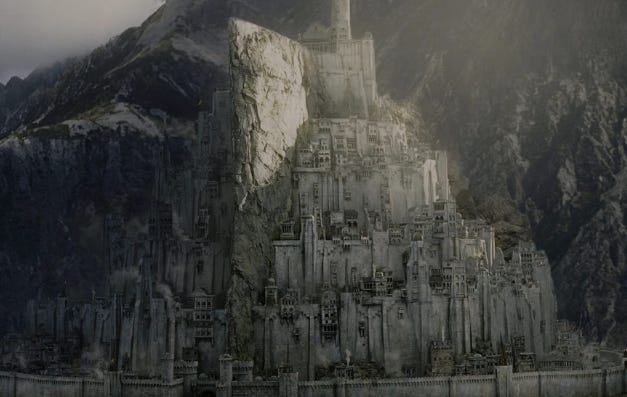
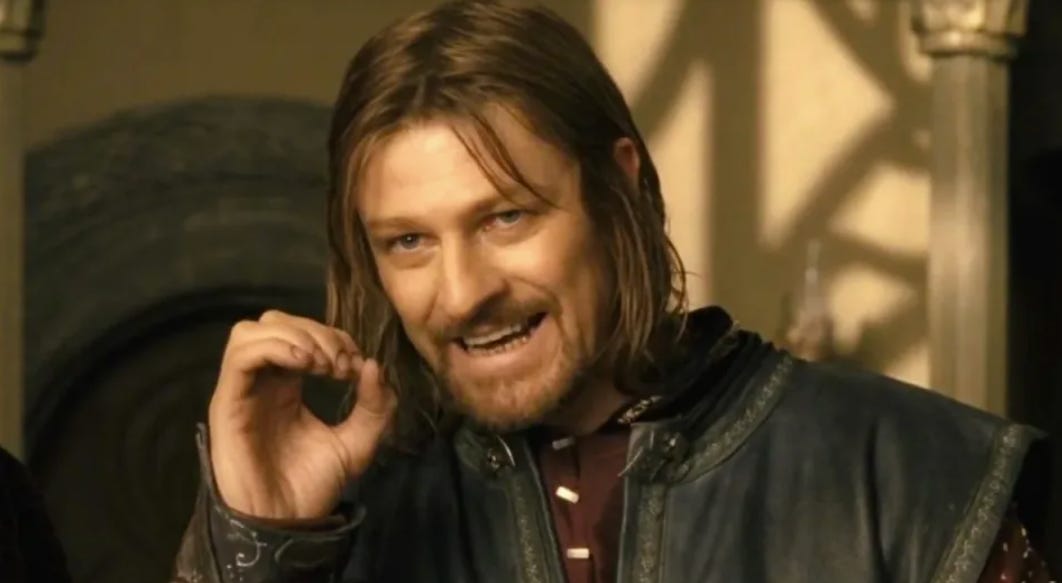
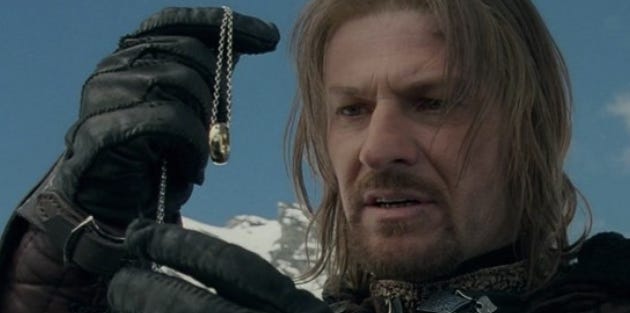
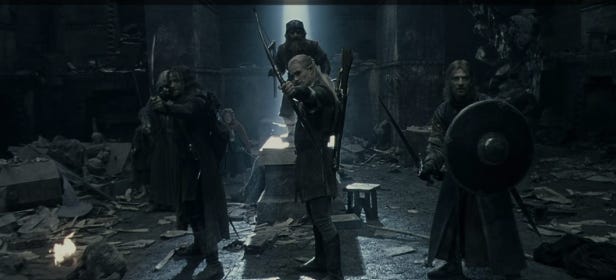
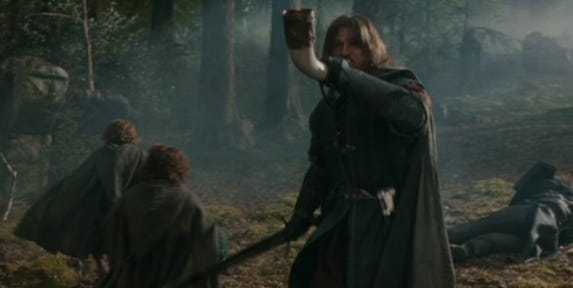
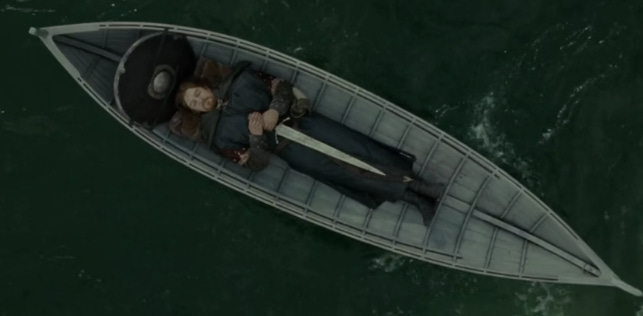
Another solid entry into this series. 2 for 2 Daniel! I’d never thought about that moment at Khazad-dum being about Boromir protecting the Ring.
I think some of the flattening of Boromir character in the films was simply due to run time and the mediums needs to do more with every moment.
That said, I think Theoden and Boromir—excellent as they are on screen overall—both suffer in the adaptation due to the imposition of Aragorns arc from reluctant heir to confident king. The scene you mention with Narsil is just one example. Flaws of leadership in both Theoden and Boromir are drawn out as a way to show contrast with Aragorn, to in turn draw out Aragorn’s more perfect qualities as would-be king. If you remove the need for Aragorn to start believing in himself (because he already does in the books) then there’s more room for Boromir good qualities to come across before his fall, in the moments of his death, and in the ways other characters remember him.
Although I grew up watching the movies, I didn’t read any of Tolkien’s works, other than The Hobbit, until I was an adult. When I did finally read them, I remember being surprised by how much I loved Boromir’s character, despite, or perhaps because of, his temptations, failures, and eventual redemption. LOTR is the gold standard for fantasy movie adaptations, in my opinion, but it’s nearly impossible to do full justice to Boromir’s character within the runtime confines of a movie.
This was a fantastic read, and now I’m in the mood to go re-read the books! Thank you!